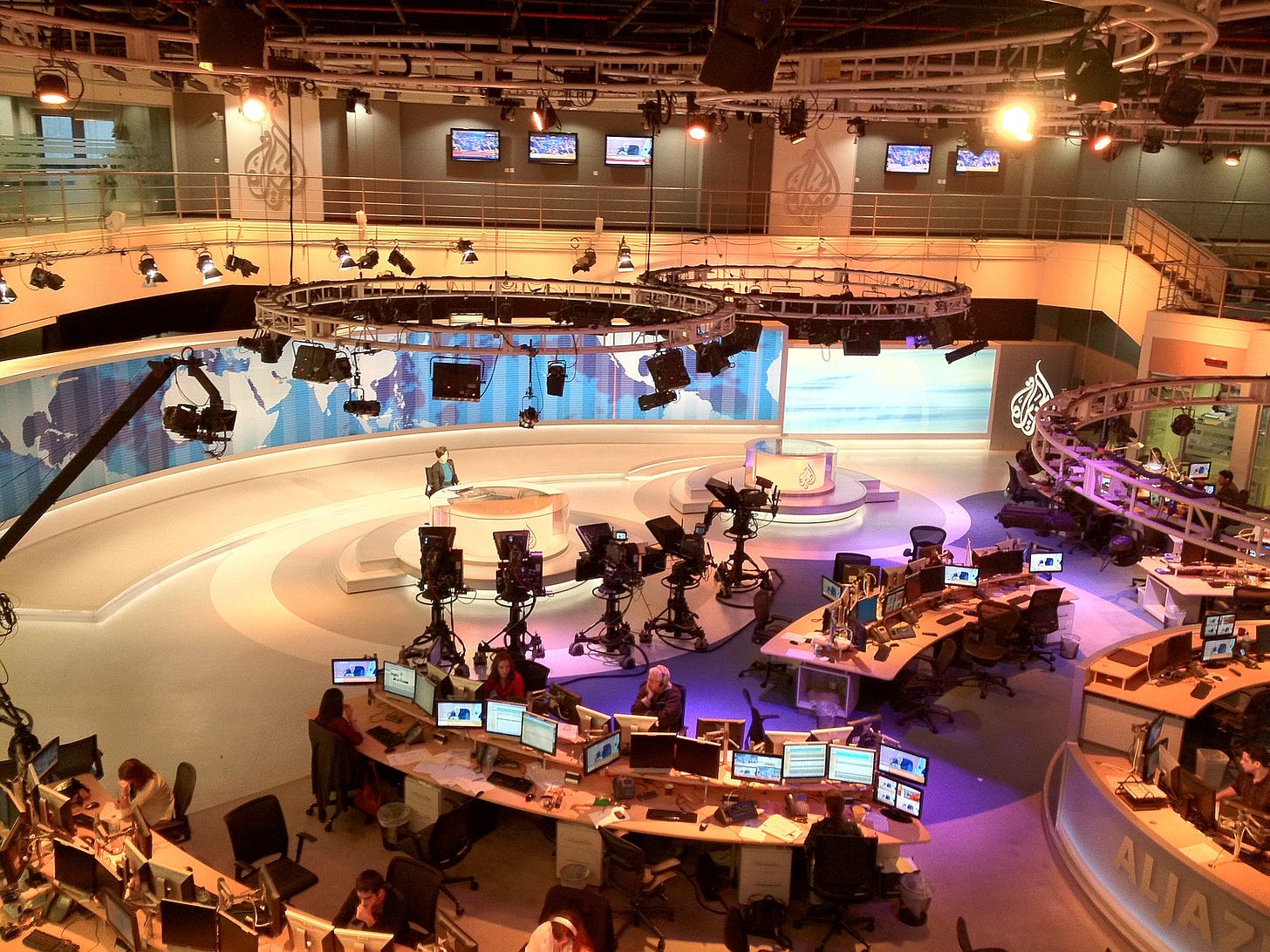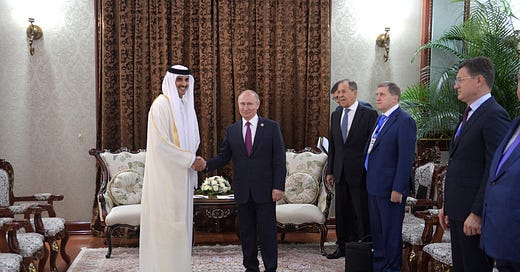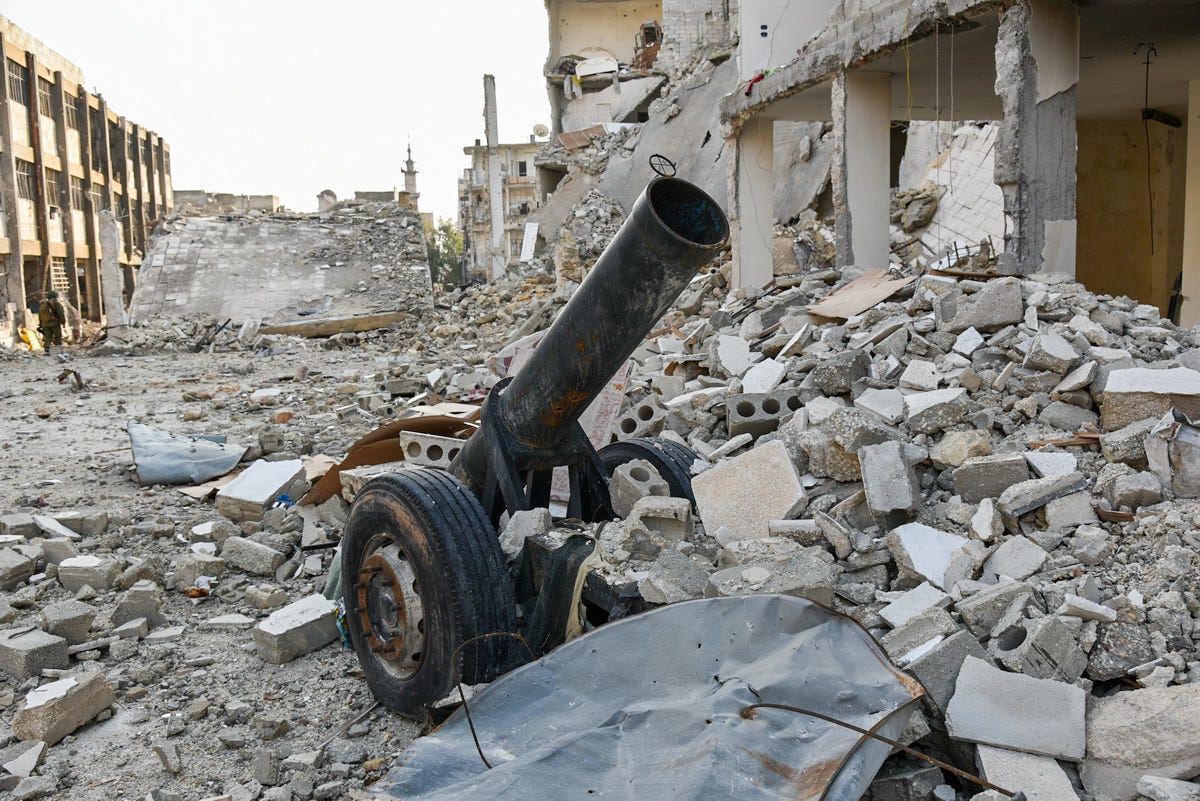Follow the Money: Why Qatar Actually Supports Hamas
Could it be that Qatar funds Hamas not just because they agree ideologically, but also because Hamas can hamper Israel from helping regional "competitors" of the Qataris?
Please consider supporting our mission to help everyone better understand and become smarter about the Jewish world. A gift of any amount helps keep our platform free and zero-advertising for all.
You can also listen to the podcast version of this essay on Apple Podcasts, Google Podcasts, and Spotify.
In 2010, a tiny desert state with less than three million residents was chosen to host the 2022 FIFA World Cup, defeating the United States in a runoff by a group of voters that had already been trimmed because two members were secretly filmed agreeing to sell their votes.
I am talking about Qatar, of course.
Then, after years of investigations and indictments, it came out that Qatari representatives had bribed FIFA officials to secure hosting rights for the World Cup. The accusations were the latest in an unprecedented, years-long corruption case that produced convictions of numerous football officials and executives, as well as depositions from former leaders of FIFA.
Now, Qatar is trying to position itself as one of the key “mediators” between Israel and Hamas, championing itself as the Middle East’s “honest broker.”1
“Over the past two decades, our nation has cultivated a reputation for mediating complex disputes,” wrote Qatari Ambassador Meshal bin Hamad Al Thani in the Wall Street Journal. Mind you, this is like a rapist treating the wounds of his victim and then asking for a pat on the back.
The Qataris have been playing this silly game for awhile now. It includes strategically spending multiple billions of dollars over multiple decades on political lobbying, public relations messaging, and massive investments in Western assets to whitewash the Persian Gulf country’s reputation.
“Qatar, from my point of view, is no different in essence than the United Nations, and the Red Cross,” said Benjamin Netanyahu in a recent meeting with families of the Israeli hostages held in Gaza. “Qatar is even more problematic.”
It is well-documented that Qatar supplies Hamas with as much as $480 million annually, making them a heavily biased “mediator.” Qatar uses a third of the subsidy to purchase fuel from Egypt and ship it to Gaza, where Hamas sells it and pockets the revenue. Another third goes to paying the salaries of Hamas bureaucrats, which allows the terror group to bankroll social services, therefore maintaining political support and prolonging its grip on power.
Qatar also gives substantial support to Hamas through its Al Jazeera television network, which provides a central platform for Hamas leaders and incitement against Israel.
True to form, while Hamas’ massacre against Israeli civilians was still in full swing on October 7th, the Qatari Foreign Ministry issued a statement saying it “holds Israel alone responsible for the current escalation due to this ongoing violations of the rights of the Palestinian people.”
Yet in the opinion piece published some three weeks later, Qatari Ambassador Meshal bin Hamad Al Thani said: “Lasting peace can be achieved only by building trust and understanding. The foundation of our success has been our ability to engage with all sides.”
So on October 7th, in the midst of one of the worst terror attacks ever, Israel is “alone responsible,” but a few weeks later, the Qataris have an ability to “engage with all sides.” Makes perfect sense, doesn’t it?
Yigal Carmon, president and founder of the Middle East Media Research Institute, put it quite bluntly: “Qatar is Hamas and Hamas is Qatar.”2
The Hamas political office in Qatar was opened in 2012 “after a request from Washington” during Barack Obama’s presidency to establish indirect lines of communication with Hamas. The presence of this Hamas office, though, “should not be confused with endorsement but rather establishes an important channel for indirect communication,” according to bin Hamad Al Thani.
Last November, however, Qatari Prime Minister Mohammed bin Abdelrahman al-Thani said something even crazier: “We have built relations with Hamas,” he explained, “in order to maintain peace and stability in the region.”
Indeed, Qatar has a long history of supporting terror and destabilizing the Middle East. Qatari funds and political support have reportedly made their way to groups like the Janjaweed, which carried out the infamous genocide in Darfur, Sudan, as well as to various branches of Al-Qaeda and the Taliban.
In 2017, Saudi Arabia, the United Arab Emirates (UAE), Bahrain, and Egypt severed ties with Qatar and imposed a blockade on the Gulf nation. Saudi Arabia said it cut ties to “protect national security from the dangers of terrorism and extremism,” while the UAE noted Qatar’s “ongoing policies that rattle the security and sovereignty of the region.”
Both countries accused the Qataris of backing the Muslim Brotherhood, the Islamist group that gave rise to Hamas. Saudi Arabia and the UAE also demanded that Qatar sever all ties to terrorist organizations, stop funding them, curtail its close ties to the Islamic Republic of Iran, terminate the Turkish military presence in Qatar, and shut down Al Jazeera and other incendiary news outlets funded by the Qataris.

Also in 2017, a U.S. congressional hearing confirmed that a top Qatari official “provided support” to Khalid Sheikh Mohammed, the mastermind of the 9/11 attacks. Top U.S. officials have said that Qatar created a “permissive terrorist financing environment.”
Still, the U.S. has used Qatar for negotiations with the Taliban and the Iranian regime. Being a mediator, though, is not what drives Qatar’s relations with regional radicals. The Qataris truly believe in the radical Islamist ideology that they peddle. The national security advisor to the Emir said that Qatar and the Taliban share “deep ideological ties.”
Qatar has gotten away with supporting terrorism and spreading radical ideology because of — you guessed it — money. Along with Iran, the Qataris own the South Pars/North Dome natural-gas condensate field located in the Persian Gulf, by far the world’s largest natural gas field. Qatar Energy is the country’s state-owned petroleum company, and its operations are directly linked with state planning agencies, regulatory authorities, and policy making bodies.
Together, revenues from oil and natural gas amount to 60 percent of the country’s GDP, and QatarEnergy is one of the largest oil and gas companies in the world. Thus, there is a saying in Washington: If you walk by the Qatari embassy, your pockets will grow.
Qatar has spent many millions on public relations firms in the U.S. and other Western countries, in addition to becoming the top foreign donor to American universities, “gifting” some $4 billion since 2001.
It has also donated to top U.S. high schools, politicians, journalists, businesses, and think tanks of all political variations, including the Brookings Institution and Atlantic Council. Salem Ali, a visiting fellow at Brookings’ Doha Center, said that in his job interview he was told he could not take positions critical of Qatar.
In addition to hosting and funding terror groups, the Qataris have been drawing closer to U.S. and European powers. Qatar hosts the largest American military presence in the Middle East, in large part because the Qataris agreed to invest $1 billion to help the Americans build it.
Saudi Arabia and the UAE have offered to move the American military base to their countries, but two years ago, U.S. President Joe Biden announced that Qatar would be designated a “major non-NATO ally,” a designation shared by a select few countries, including Israel. Former U.S. President Donald Trump, meanwhile, was not much better. One day after calling Qatar a sponsor of terrorism, he sold the nation $12 billion worth of weapons.
The Qataris also use their influence and proceeds from Western investments to steal intellectual property, fund terrorism, and foment anti-Israel and anti-American sentiment through its funding to universities, to pro-Hamas groups, and its propaganda machine, Al Jazeera.
The TV network has several “journalists” in Gaza, including Hamza Dahdouh, the son of veteran Al Jazeera correspondent Wael Dahdouh. A few weeks ago, Hamza and Mustafa Turia, a videographer working for the global news agency AFP, were killed during an Israeli strike on a vehicle that they were both in.
In the minutes before the incident, the IDF located a drone that was operating in the area. The drone was identified as a hostile aircraft, which had already been operated in the past by Hamas for the purpose of tracking the movements of IDF soldiers.
In this incident, the IDF was also able to identify the control device of that drone, which was in the exact same vehicle Hamza was in. And who was operating this drone? Mustafa Turia, a familiar figure to the IDF. Although a videographer, he was also a scout in the service of Hamas. But this did not stop U.S. Secretary of State, Antony Blinken, from eulogizing Hamza’s death.
“I regret from the bottom of my heart the killing of Hamza,” said Blinken, when he addressed the matter at a press conference in Qatar. “I’m a parent myself, and it’s a tragedy. I am deeply, deeply sorry for the almost unimaginable loss. Too many innocents have been killed.”
During Obama’s presidency, Blinken was Deputy Assistant to him and then Deputy Secretary of State. And it was Obama’s presidency that facilitated Qatar’s rise to prominence.
Both Obama and Hillary Clinton as Secretary of State shifted the priorities in America’s Middle East policy, disassociating themselves from their traditional ally in Saudi Arabia for a new anchor in this region. They stayed their choice on Qatar.
As a result, with a rather transparent support of the Qataris (backed by Obama and Clinton), the consolidation of some radical groups related to Muslim Brotherhood commenced. Later these groupings would evolve into ISIS in its new formation, using Al Jazeera and other pro-Qatar media as a mouthpiece for radical preachers of political Islam.
At the same time, the unwillingness of Syrian President Bashar al-Assad to build a new gas pipeline from Qatar to the Mediterranean over Syrian territory and ultimately to Europe, prompted Qatar to fund anti-Assad rebel groups, which led to the Syrian civil war. (Some believe Russia pressured Assad to reject the pipeline to safeguard its own business.)
Iran, which owns the other smaller share of the Persian Gulf gas field, decided to lodge its own rival plan for a $10-billion pipeline to Europe via Iraq and Syria, and then under the Mediterranean Sea. These plans apparently had Russia’s blessing, possibly because it could exert more influence over Iran. Assad signed off on the Iranians’ plan in 2012.
The Qataris are not the only ones who want to build an energy pipeline from the Middle East to Europe. As part of Saudi-Israeli normalization process that was gaining serious steam before Hamas’ October 7th onslaught, there had been talks of constructing energy pipelines from India and Saudi Arabia, through Israel, to Europe — called the India-Middle East-Europe Economic Corridor.
Thus, Hamas’ decision to invade, massacre, and kidnap on October 7th could very well be part of a bigger plan to disrupt Saudi-Israeli normalization and, thus, the India-Middle East-Europe Economic Corridor. Qatar, Iran, and Russia — all “friends” of Hamas — do not want to see the Saudis get any richer and gain more geopolitical power, especially if it means that they cannot share in the profits.
Hence, Qatar (as well as Iran) fund Hamas to be a thorn in Israel’s side not just because they agree ideologically, but also because Hamas can hamper Israel from helping regional “competitors” of the Qataris and Iranians.
Viewed through a geopolitical and economic lens, the conflict in Gaza might not be another chapter in the Israeli-Palestinian saga, but the result of larger international players positioning themselves on a regional chessboard, vying to lock in potentially trillion-dollar arrangements and thus more global influence.
And this is what most people do not realize about the Palestinians: They have for decades repeatedly been used as pawns in someone else’s chess game. From the Egyptians and Jordanians, to the Syrians and Soviets, to the Iranians and the Qataris, the “Palestinian cause” is really just a cover for other countries’ geopolitical and financial masterplans.
Only when more of the world sees this for what it is will Israel and the Palestinians be able to charter a new, more beneficial path for themselves and for the region.
“Qatar Is the Mideast’s Honest Broker.” Wall Street Journal.
“Israel Sends Mixed Messages To Iran’s Ally Qatar.” Iran International.






I've known about Qatar's financial influence, but can now see clearly how their game is being played thanks to you, Joshua. As I read, it sounded like a "Theatre of the Absurd." I agree with you that Israel and the Saudis were close to a normalization agreement and it was too close for comfort for Qatar, Iran, etc. As you said and identified, Qatar money can be influential on both sides of the political spectrum, but therein lies the danger for the US and anywhere else they have influence. How far will our politicians go to put us in danger in exchange for their deep pockets? That's for the future, but the future may be closer than we think.
And role of Israel’s support of Quatar’s support $ of Hamas ?